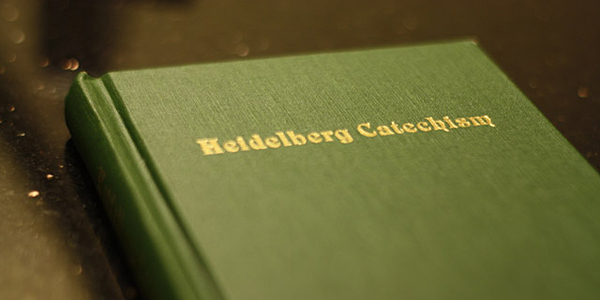The 1975 CRC Synod will be asked to adopt a new translation of the Heidelberg Catechism. It is to this matter that Rev. Harry Downs addresses himself in this article. Rev. Downs is pastor of the Christian Reformed Church in Dresden, Ontario. I regret that, at the time which I had to complete this article in […]
As one of the Doctrinal Standards of the Christian Reformed Church, the Heidelberg Catechism is familiar to readers of THE OUTLOOK, and the proposed new translation of it is of special interest and concern. Rev. Nicholas De Vries, of Ripon, California was asked to evaluate this new translation and he herewith complies with this request. […]
LESSON 17 The Last Things Scripture Reading: I Corinthians 15:20–28; 51–54; Revelation 21:1–5 Main Dines of Reformed Doctrine is a series written by Rev. John H. Piersma, pastor of the Bethany Chrisitan Reformed Church of South Holland, Illinois. This series, concluded in this issue, was designed specifically for church societies, study groups, and all others interested. […]
Main Lines of Reformed Doctrine is a series written by Rev. John H. Piersma, pastor of the Bethany Christian Reformed Church of South Holland, Illinois. This series is for church societies, study groups, and all others interested. Two lessons appear each month. Scripture Readings: Ephesians 1: 15–23; Revelation 19:6–10 It appears as if we need […]
Main Lines of Reformed Doctrine is a series written by Rev. John H. Piersma, pastor of the Bethany Christian Reformed Church of South Holland, Illinois. This series is for church societies, study groups, and all others interested. Two lessons appear each month. LESSON 13 The Way of Salvation (A) Scripture Readings: John 3:1–16; Romans 5:1–8. […]
This completes the Studies on the Canons of Dordt. We wish to thank Miss Timmer for her efforts to make this beautiful confession of the Church alive with the warmth of the Reformed faith. We pray that God will use these studies for a greater appreciation at Scriptural truth in our day. LESSON THIRTY-TWO ART. 10. […]
LESSON TWENTY-EIGHT ART. 15. THE GRACE OF REGENERATION IS AN UNMERITED GIFT Unworthy The grace of regeneration is a gift of God. That is wonderful. The wonder increases for us, however, in proportion to our realization of our unworthiness of the gift. God who is in no wise obligated to save us, saved us! Without […]
LESSON TWENTY-FIVE PARTS III-IV ART. 9. FAULT OF REJECTION NOT IN GOD, BUT IN MAN The Gospel Is Faultless The Gospel is not at fault. It is the Gospel of God unto salvation. The Gospel is the good news. There is no bad news in it except for those who reject the good news. The […]
LESSON TWENTY-TWO ART. 2. “A CORRUPT STOCK PRODUCED A CORRUPT OFFSPRING.” Like Begets like Like begets like. Fallen man begets fallen children. Adam’s sin caused all his descendent’s to be conceived and born in sin, Jesus excepted. The innocent looking babe you saw the other day is not innocent, but came into the world laden with […]
CANONS OF DORT Jesus Christ “was made sin, and became a curse for us and in our stead, that He might make satisfaction to divine justice on our behalf” (II, 2). “It was the will of God that Christ by the blood of the cross, whereby He confirmed the new covenant, should effectually redeem out […]







